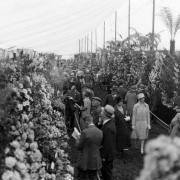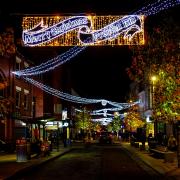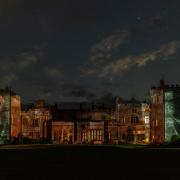What does it take to grow the ingredients needed to meet the demands of a Michelin starred restaurant?

Charlie Munro knows he is a lucky man. Each morning the 47-year-old pulls open the curtains of his campervan to reveal some of the most beautiful views the Lake District has to offer. Each night he chooses a different location – it’s exactly the kind of nomadic life he loves. What makes it even more special is that the stunning vistas continue when he’s at work.
‘It’s not something I’ll ever get used to,’ said Charlie. ‘I know I’m really fortunate to live and work in a beautiful place like this. It is demanding and hard but it really is worth it to be here.’
Work for Charlie is no ordinary job. He is the head gardener at the Michelin-starred Forest Side in Grasmere. A restaurant and hotel that, despite only being open a little over two years, has gained not only that coveted star but also a remarkable clutch of accolades, including a Lancashire Life Food & Drink Award.
It’s a place where the philosophy towards food is built on the talent of growers, producers and makers of the best food and drink from the region’s landscape. This is then crafted into exquisite dishes by head chef Kevin Tickle, himself a keen forager, who uses his skills to allow that local produce to shine. The kitchen garden plays a huge role in making that possible

‘There is a lot of planning that goes into everything here and the gardens are no different,’ said Charlie. ‘I work with Kevin to try to get the results he would like. It’s hard to plan everything because there are so many elements that can affect crops but I think we do a pretty good job. Seeing the produce and how it looks once it’s plated up is really fantastic and rewarding.’
Watching Charlie manoeuvre around the garden is fascinating. He can’t help but touch, feel and smell the fruits of the labours put in by a small garden team. He scrutinises the black indigo rose tomatoes, enthuses about the ripeness of the strawberries – they really are like nothing you’ve ever tasted – the colour of the ruby red cherry belle radishes or the pungent smell of the tiny spring onions make him beam. He can create all of this with the knowledge he has built up over the past two decades.
Fed up with being stuck at a desk, Charlie, originally from Hertfordshire before moving to Devon, did a countryside course at Bicton Agricultural College and for some years ran a gardening business, including looking after a Torquay hotel with 26 acres of gardens and grounds.
He then became head grower at Somerset Micro Herbs where he worked with some of the country’s best chefs. This led to becoming co-head gardener for Novikov Restaurant at Brent Eleigh Hall’s walled garden, before heading north 18 months ago to take the helm at Forest Side.

He puts his expert knowledge to good use as well as sharing it with guests on private garden tours done in conjunction with the National Garden Scheme.
‘It’s really good fun being able to talk with other people who are interested in what we’re doing here,’ said Charlie. ‘It’s a part of the job I love.’
As well as growing produce you might find in many kitchen gardens, Charlie also grows unusual micro herbs and vegetables that add impact to the dishes coming out of the Forest Side kitchen. The garden is planted with more than 100 varieties of vegetable and 25 types of herb and aims to supply 60 to 70 per cent of the produce needed. Everything is farmed using ethical growing techniques, with no chemical herbicides or fertilisers.
By reducing the length of time from farm to fork this increases the nutrient content and flavour quality of the produce. The garden also supplies the kitchen with a broad selection of micro greens, used for garnishes, a growing technique that increases the nutrient content by up to ten times. These are grown in the garden’s traditional greenhouse, a vital resource to supplement what is produced in the garden.

Each morning, time is spent delicately harvesting fruit and vegetables to go over to the kitchen team in the main hotel, which was built for wealthy Manchester solicitor Stephen Heelis in 1853. Charlie speaks with head chef Kevin regularly to ensure the right things are being grown and also to discuss new things they can trial.
‘It’s an exciting place to work,’ said Charlie. ‘To be able to see what can be created with vegetables and food we grow here is a fascinating thing to watch.
‘Not everything works, but I can usually tell quite quickly if it will. The best thing is when Kevin gets really excited about something because I know it’s worked perfectly. That makes me really happy.’
That close relationship with Kevin is integral. And having a kitchen garden just a few steps away is invaluable for the former L’Enclume chef.
‘Fresh local produce is the underpin of what I do and what we create in the kitchen,’ said Kevin. ‘We aren’t just focused on what you eat when you dine with us, we are concerned where our produce is grown, raised or reared. Ultimately we are striving for a more sustainable and organic food chain.
‘What we can’t source locally we grow in our own kitchen garden, which provides us with the fresh seasonal fruit and vegetables we need, as well as an array of flowering plants and herbs. At Forest Side we recognise, know and care about each step of the journey from kitchen garden, field, hedgerow, fell top, sea shore and even forest floor to the plate.’



























